Selling Virginia land by owner is absolutely possible, but success depends on understanding your local market, preparing proper documentation, and choosing the right selling method for your timeline. Virginia's land market offers strong opportunities in 2025, with clear legal processes and multiple viable selling options to maximize your results. Let's jump in and help you sell your land!
Key Takeaways:
- Virginia land values averaged $11,302 per acre in Northern Virginia, with rural counties offering more affordable options around $5,950 per acre.
- The traditional selling process takes 6-12 months and involves significant preparation, marketing costs, and complex legal requirements through Virginia's Circuit Court system.
- Cash buyers can close Virginia land sales in 2-4 weeks with no fees, eliminating lengthy marketing periods and financing contingencies.
Quick Note: If you're looking to skip the traditional sales process, we buy Virginia land fast and can provide a free, no-obligation cash offer within 48 hours.
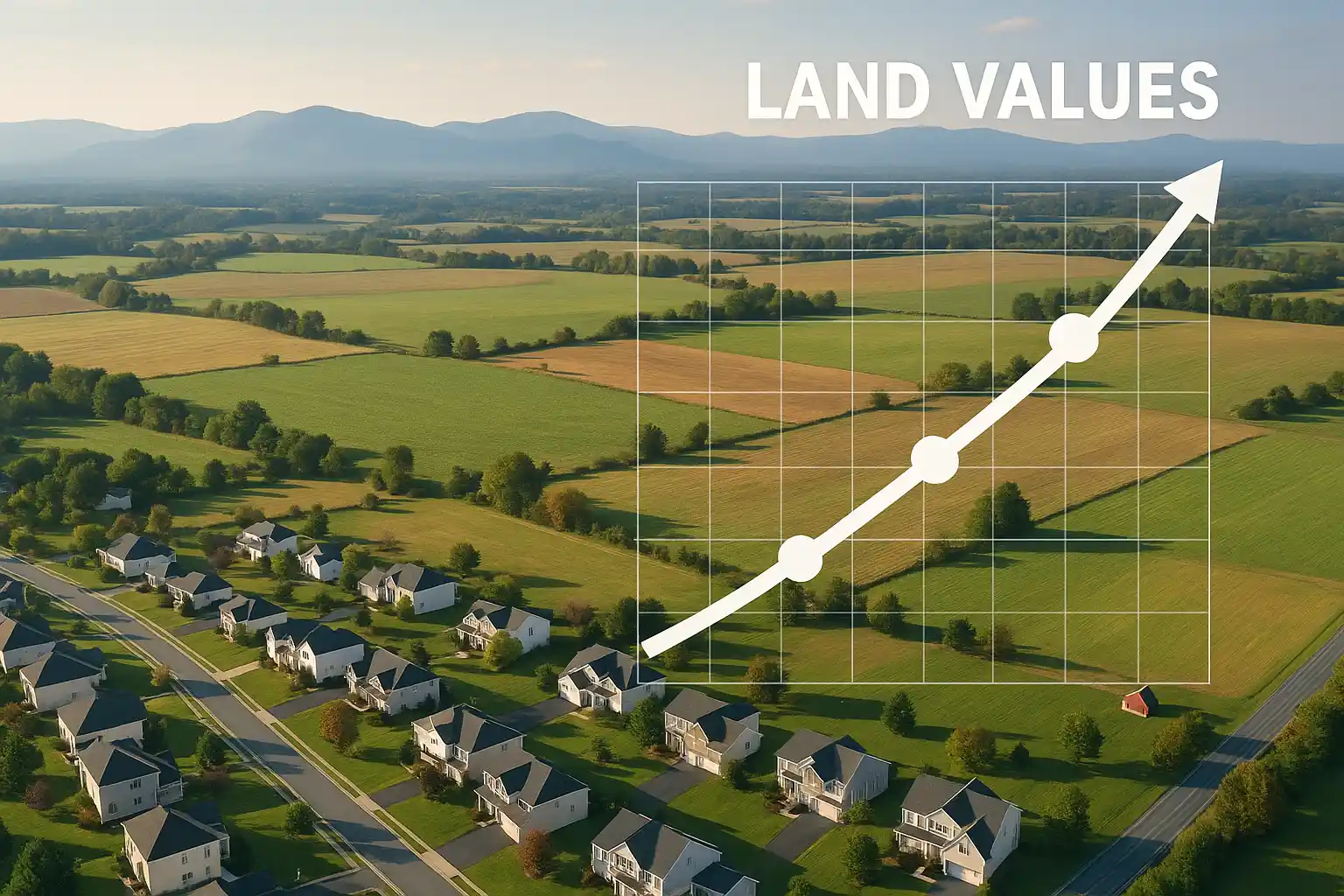
Understanding the Virginia Land Market in 2025
Virginia's land market continues showing strong momentum in 2025, with distinct regional patterns that smart sellers need to understand. Whether you own rural acreage in the Shenandoah Valley or a residential lot near Richmond, knowing your local market dynamics is crucial for a successful sale.
Current Market Trends and Pricing
The Virginia land market has experienced solid growth, with Northern Virginia leading the charge:
- Northern Virginia: Average prices hit $11,302 per acre, representing an 8.8% increase from previous years
- Rural counties: Significantly more affordable options, averaging around $5,950 per acre
- Waterfront properties: Premium pricing along the Chesapeake Bay and Atlantic coast
- Agricultural land: Strong demand with Virginia's average farm size at 187 acres
Regional Market Variations
Virginia's diverse geography creates distinct pricing zones:
High-Value Areas:
- Northern Virginia (proximity to Washington D.C.)
- Richmond metropolitan area
- Virginia Beach and coastal regions
- Wine country in central Virginia
Affordable Options:
- Southwest Virginia mountain regions
- Rural agricultural counties
- Timber and hunting properties in southern Virginia
What's Driving the Market
Several factors are influencing Virginia land values in 2025:
- Population growth in urban corridors
- Limited land supply near major cities
- Increased demand for recreational properties
- Strong agricultural economy supporting farmland values
- Remote work trends driving rural property interest
Understanding these market dynamics helps you price competitively and choose the right selling strategy. For detailed Virginia land market evaluation and insights, including county-by-county analysis, professional guidance can help you navigate these regional differences effectively.
The key takeaway? Virginia's land market offers opportunities, but success depends on understanding your specific location's unique characteristics and current demand patterns.
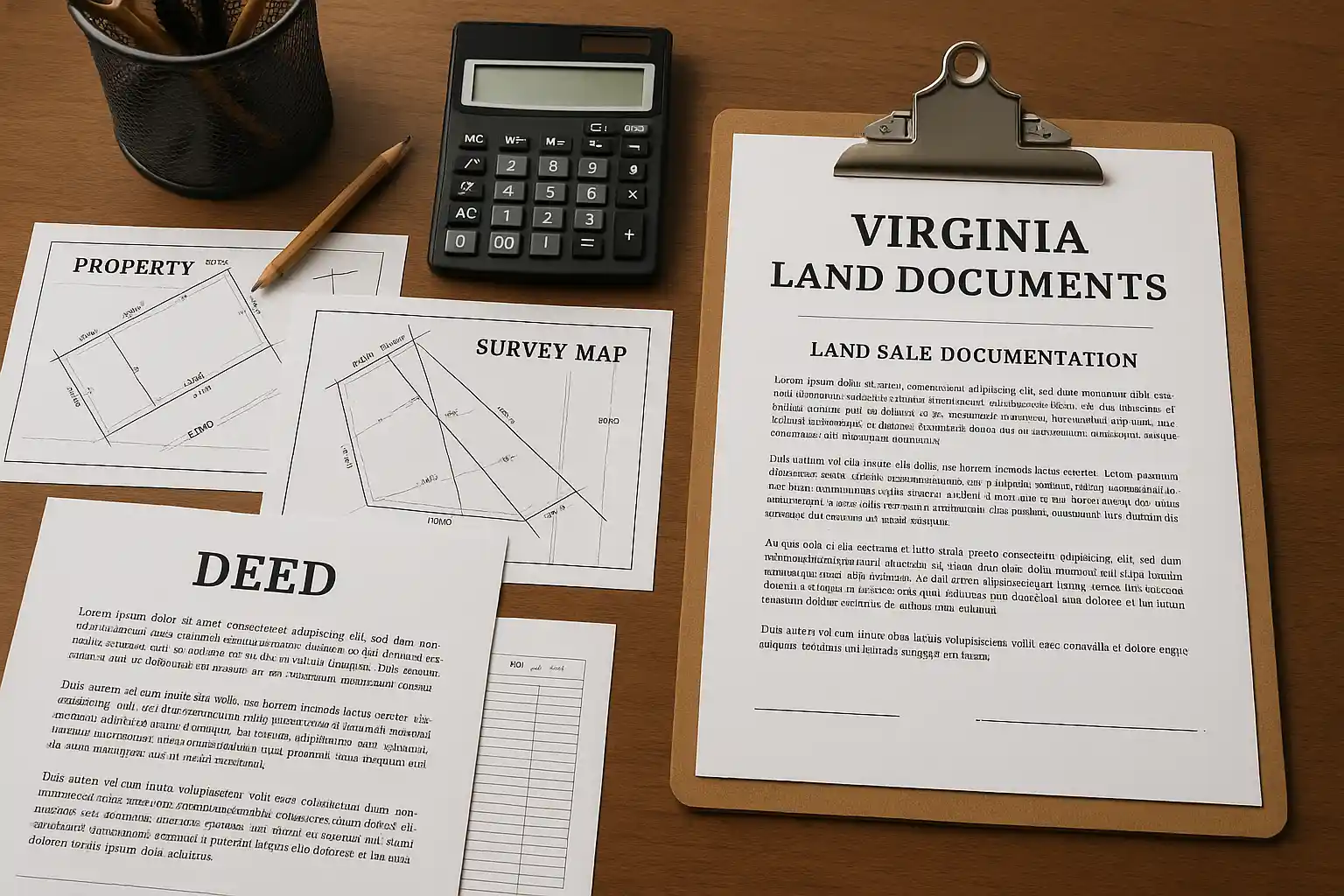
Step 1: Preparing Your Virginia Land for Sale
Before listing your Virginia land, proper preparation can mean the difference between a quick sale and months of delays. Virginia's specific legal requirements make thorough preparation essential for avoiding costly surprises during the closing process.
Gather Essential Documentation
Start by collecting all property-related documents:
- Original deed or copy from Circuit Court records
- Survey maps and boundary documentation
- Tax records for the past 3-5 years
- Zoning certificates and permit history
- HOA documents if applicable
- Mineral rights information
Verify Property Boundaries and Access
Virginia law requires clear property boundaries for successful transfers:
- Order a professional survey if boundaries are unclear
- Confirm legal access to the property via public roads or easements
- Check for encroachments from neighboring properties
- Verify utility easements and right-of-way agreements
Clear Title Issues
Virginia's Circuit Court Clerk system makes title research straightforward, but issues still arise:
Common Title Problems:
- Unpaid property taxes or liens
- Deceased previous owners requiring probate
- Missing signatures on previous deeds
- Unclear mineral or water rights
Resolution Steps:
- Conduct a preliminary title search through your county's Circuit Court
- Resolve any outstanding liens or tax issues
- Consider Transfer on Death deeds if inherited property is involved. Read more about in our Virginia inherited land sale guide
- Obtain title insurance for buyer protection
Environmental and Zoning Considerations
Virginia's diverse landscape requires specific attention to:
- Wetland designations and environmental restrictions
- Agricultural vs. residential zoning classifications
- Septic system requirements for buildable lots
- Well water testing, if applicable
Taking these preparation steps seriously can reduce your closing timeline from months to weeks. While the process might seem overwhelming, having everything organized upfront prevents delays and builds buyer confidence in your property.
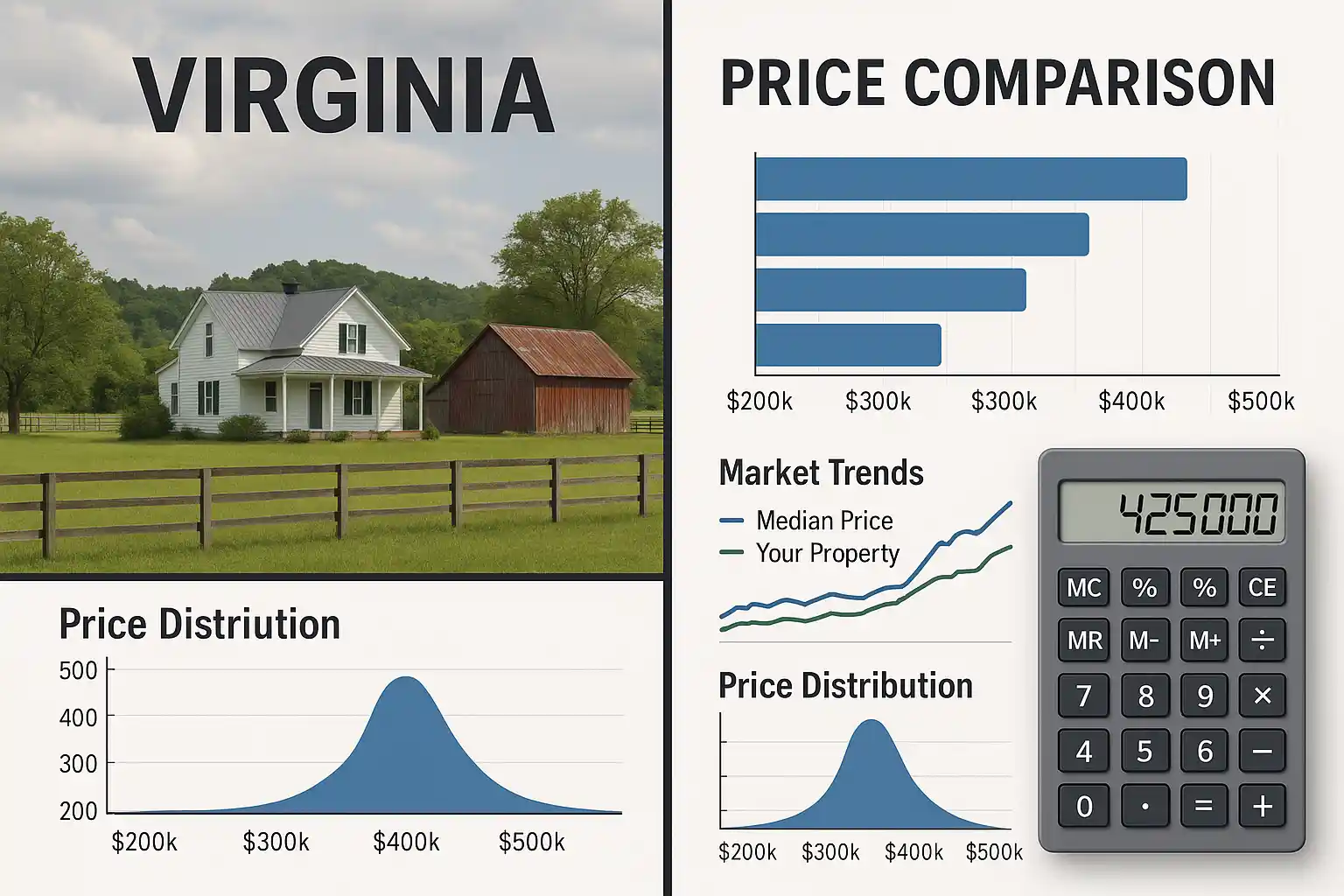
Step 2: Pricing Your Virginia Land Correctly
Pricing Virginia land accurately requires understanding both your local market and the unique factors that influence land values across the Commonwealth. Get this wrong, and you'll either leave money on the table or watch your property sit unsold for months.
Research Comparable Sales
Start with a thorough comparative market analysis (CMA):
- Recent sales within 1-2 miles of your property
- Similar acreage and land characteristics
- Sales within the last 6-12 months for current market conditions
- Zoning and use restrictions that match your property
Use Virginia's Circuit Court records to research actual sale prices, not asking prices. Many online estimates can be wildly inaccurate for vacant land.
Key Factors Affecting Virginia Land Values
Virginia's diverse geography creates significant pricing variations:
Location Premium Factors:
- Proximity to major cities (Richmond, Norfolk, Washington D.C.)
- Waterfront access (Chesapeake Bay, rivers, lakes)
- Mountain views and recreational appeal
- School district quality for buildable lots
Property-Specific Variables:
- Utilities availability: Electric, water, sewer access
- Road frontage: Paved vs. gravel vs. no direct access
- Topography: Level, rolling, or steep terrain
- Soil conditions: Perc test results for septic systems
Professional Valuation Options
Consider these pricing approaches:
- Licensed appraiser: Most accurate but costs $400-800
- Realtor CMA: Free with listing agreement
- Online calculators: Quick estimates but often unreliable
- Tax assessments: Usually below market value
For a detailed analysis of Virginia land costs by county, professional guidance helps you understand regional pricing patterns that significantly impact your property's value.
Pricing Strategy Considerations
Remember that pricing affects your selling timeline:
- Aggressive pricing: Attracts multiple offers but may leave money behind
- Market pricing: Balanced approach for a reasonable timeline
- Premium pricing: Maximizes profit but extends the selling period significantly
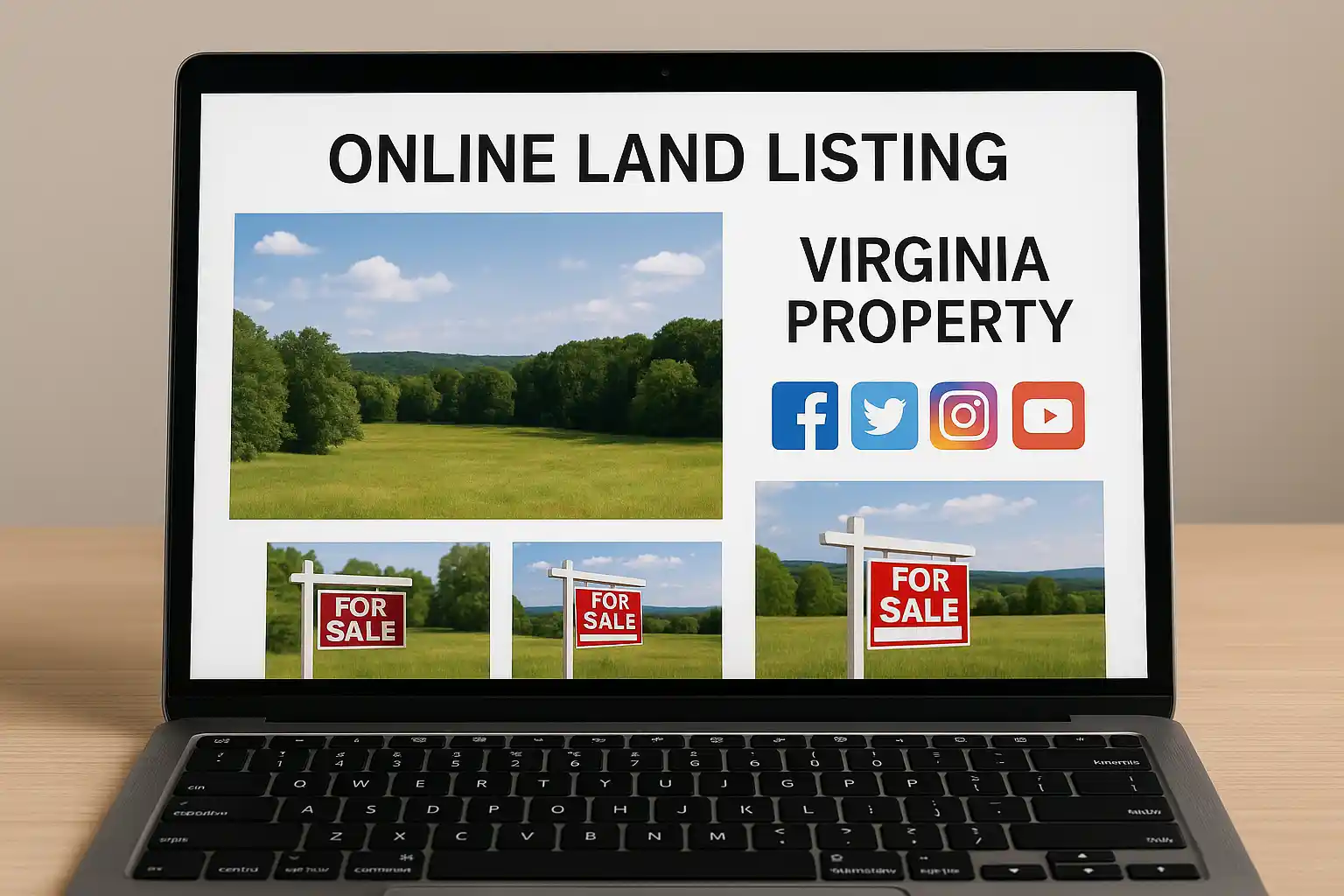
Step 3: Marketing and Finding Buyers for Virginia Land
Marketing vacant land requires a different approach than selling homes. Virginia land buyers have specific needs and search in unique places, so your marketing strategy must reach the right audience with compelling information.
Traditional Marketing Channels
Real Estate Agents:
- Choose agents with land specialization experience
- Expect 6-10% commission fees
- Timeline typically 6-12 months
- Access to MLS and professional networks
For Sale By Owner (FSBO):
- Save on commission costs
- Requires significant time investment
- Handle all inquiries and paperwork yourself
- Success depends on your marketing skills
Online Marketing Platforms
Digital marketing reaches more potential buyers cost-effectively:
Specialized Land Websites:
- LandWatch, Land and Farm, LandHub
- Target serious land buyers actively searching
- Professional photos and detailed descriptions essential
- Monthly listing fees typically $100-300
Social Media Marketing:
- Facebook Marketplace for local exposure
- Instagram for visual property showcasing
- Nextdoor for neighborhood connections
- Specialized Virginia land buyer groups
Creating Compelling Marketing Materials
Virginia land buyers want specific information:
Essential Details to Highlight:
- Exact acreage and survey information
- Zoning classification and building restrictions
- Utility availability (electric, water, sewer)
- Road access type and condition
- County and school district information
- Tax amounts and assessment values
Visual Marketing Elements:
- Aerial photography showing property boundaries
- Ground-level photos of key features
- Maps showing location relative to cities
- Plat surveys for serious inquiries
Targeting the Right Buyers
Different land types attract different buyers:
- Residential lots: Families and custom home builders
- Agricultural land: Farmers and investors
- Recreational property: Hunters and outdoor enthusiasts
- Commercial parcels: Developers and business owners
One drawback of traditional marketing is the time investment required to attract qualified buyers. You'll spend considerable time answering inquiries, scheduling showings, and filtering serious buyers from casual browsers.
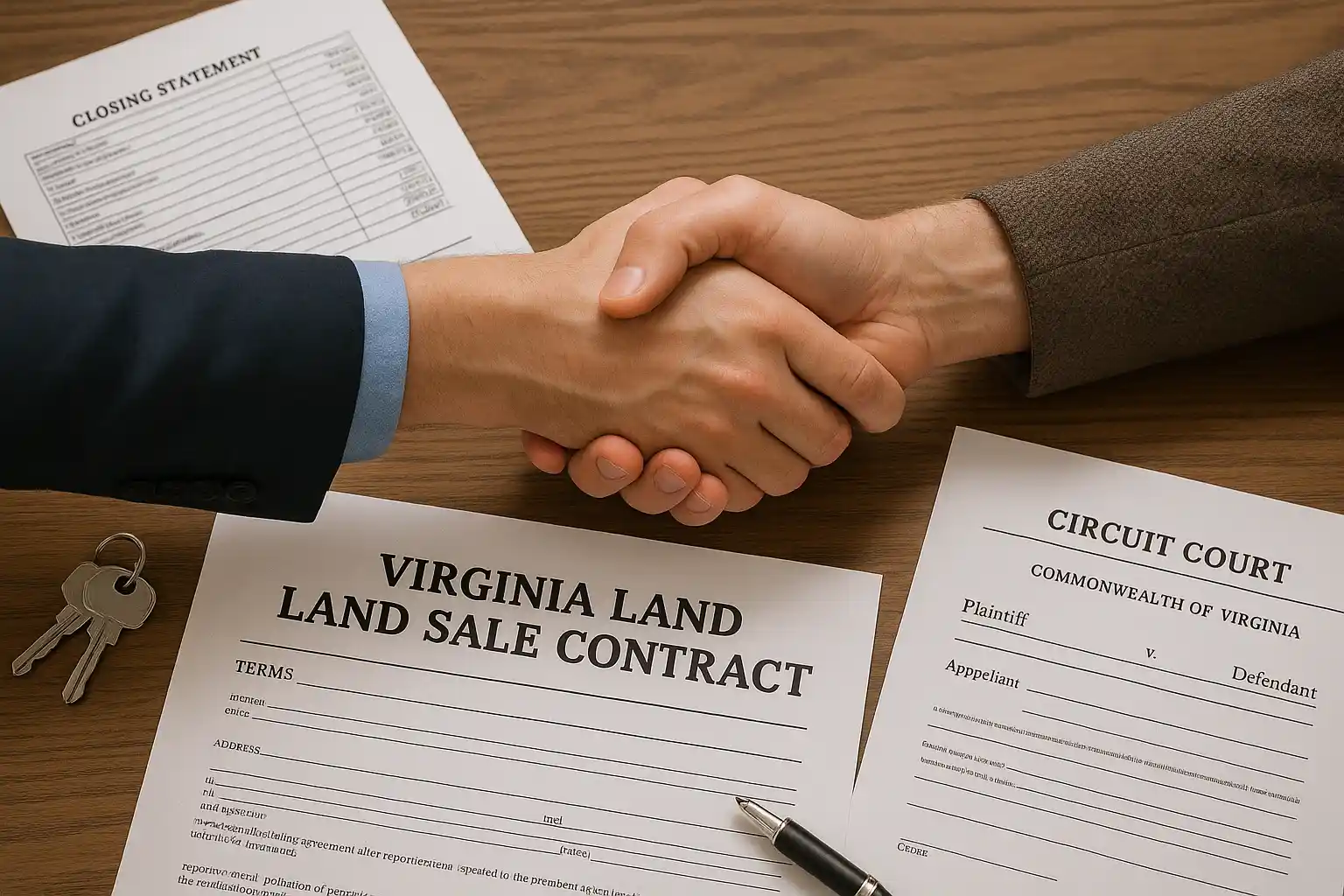
Step 4: Negotiating and Closing Your Virginia Land Sale
Negotiating and closing a Virginia land sale involves multiple complex steps that can take weeks or months to complete. Understanding Virginia's specific requirements helps you navigate this process smoothly and avoid costly delays.
Purchase Agreement Negotiation
When offers start coming in, several key terms need negotiation:
Price and Payment Terms:
- Purchase price and earnest money deposit
- Financing contingencies and timeline
- Seller financing options if applicable
- Closing date flexibility
Due Diligence Periods:
- Buyer's inspection timeline (typically 30-45 days)
- Survey and title search completion
- Environmental assessments if required
- Financing approval deadlines
Virginia-Specific Legal Requirements
Virginia land transfers must comply with state regulations:
- Virginia Residential Property Disclosure Act requirements
- Proper deed preparation and notarization
- Recording through your county's Circuit Court Clerk
- Transfer tax calculations and payments
- Transfer on Death deed considerations if applicable
Title Search and Insurance Process
Virginia's title requirements include:
Mandatory Steps:
- Professional title search going back 60+ years
- Resolution of any liens or encumbrances
- Title insurance policy preparation
- Final title commitment before closing
Common Issues That Cause Delays:
- Missing signatures on previous deeds
- Unresolved estate matters
- Survey boundary disputes
- Outstanding tax obligations
Closing Costs and Timeline
Expect these typical Virginia closing expenses:
- Title search and insurance: $800-1,500
- Attorney fees: $500-1,200
- Survey costs: $400-800
- Recording fees: $50-150
- Transfer taxes: Varies by county
The traditional closing process typically takes 45-90 days from accepted offer to final closing.
Managing this process requires constant communication with buyers, attorneys, and title companies while hoping no unexpected issues derail your closing.
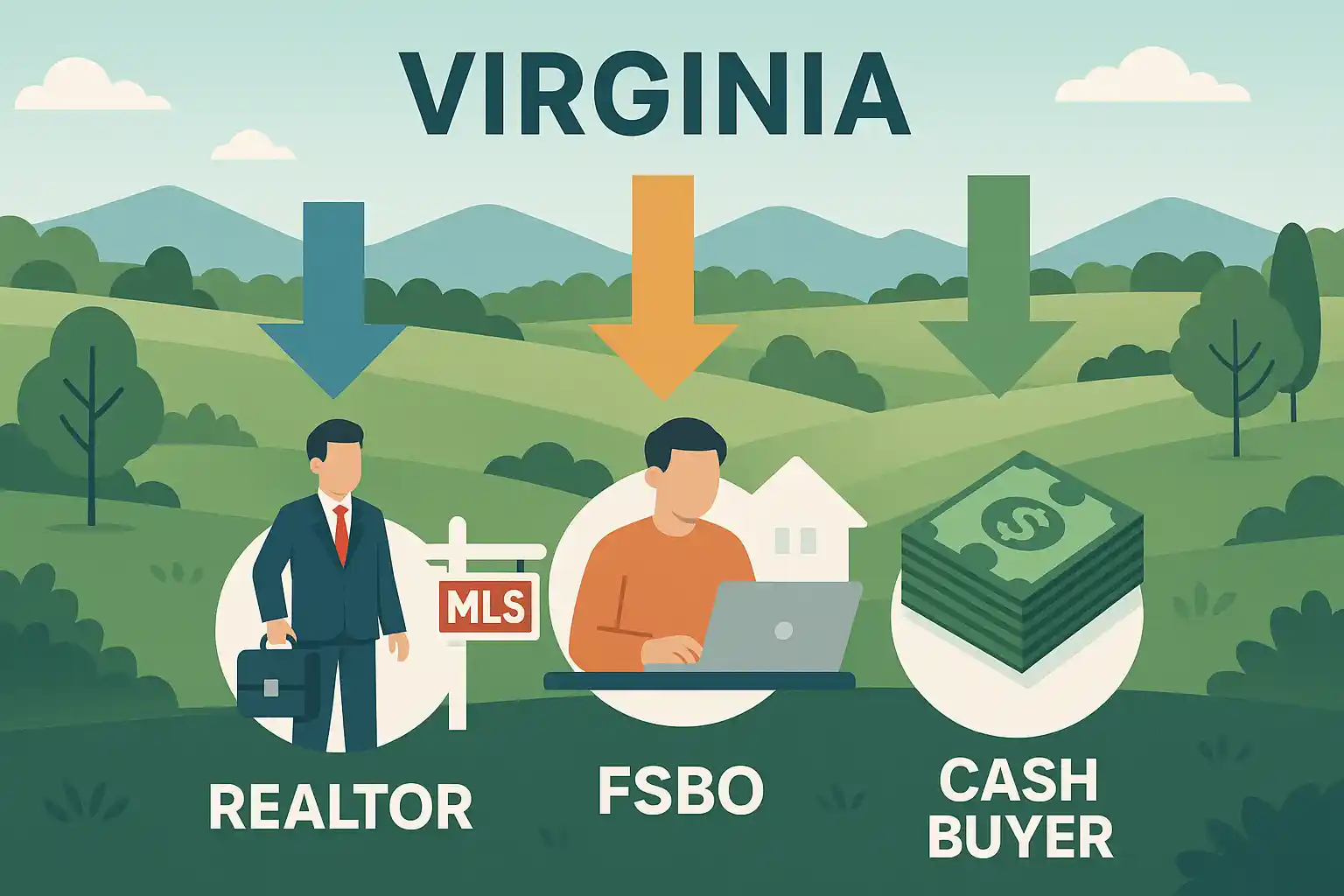
3 Ways to Sell Land in Virginia (Pros and Cons)
Virginia landowners have three primary selling options, each with distinct advantages and drawbacks. Understanding these methods helps you choose the approach that best fits your timeline, financial goals, and personal circumstances.
Method 1: Traditional Real Estate Agent
Pros:
- Professional marketing and MLS exposure
- Experienced negotiation and contract handling
- Network of potential buyers and other agents
- Guidance through complex legal processes
Cons:
- 6-10% commission fees reduce your net proceeds
- Average timeline of 6-12 months to close
- Limited control over marketing decisions
- May not specialize in vacant land sales
Method 2: For Sale By Owner (FSBO)
Pros:
- No commission fees maximize your profits
- Complete control over pricing and marketing
- Direct communication with potential buyers
- Flexibility in negotiation terms
Cons:
- Significant time investment for marketing and showings
- Handle all legal paperwork and requirements yourself
- Limited marketing reach without MLS access
- Risk of legal mistakes during closing process
- Difficulty screening serious buyers from casual inquiries
Many FSBO sellers find success using websites to sell land fast to expand their marketing reach beyond traditional methods.
Method 3: Cash Land Buyers
Pros:
- Fastest option with 2-4 week closings
- No fees, commissions, or marketing costs
- Cash offers eliminate financing contingencies
- Handle all paperwork and legal requirements
- Buy land in any condition
Cons:
- Purchase prices typically below retail market value
- Less negotiation flexibility on terms
- Need to research buyer credibility
Best For:
- Sellers prioritizing speed and convenience
- Properties requiring significant preparation work
- Inherited land with title complications
- Owners facing financial deadlines
Each method serves different seller priorities. Traditional agents maximize exposure, FSBO saves money but requires effort, while cash buyers prioritize speed and simplicity over maximum price.
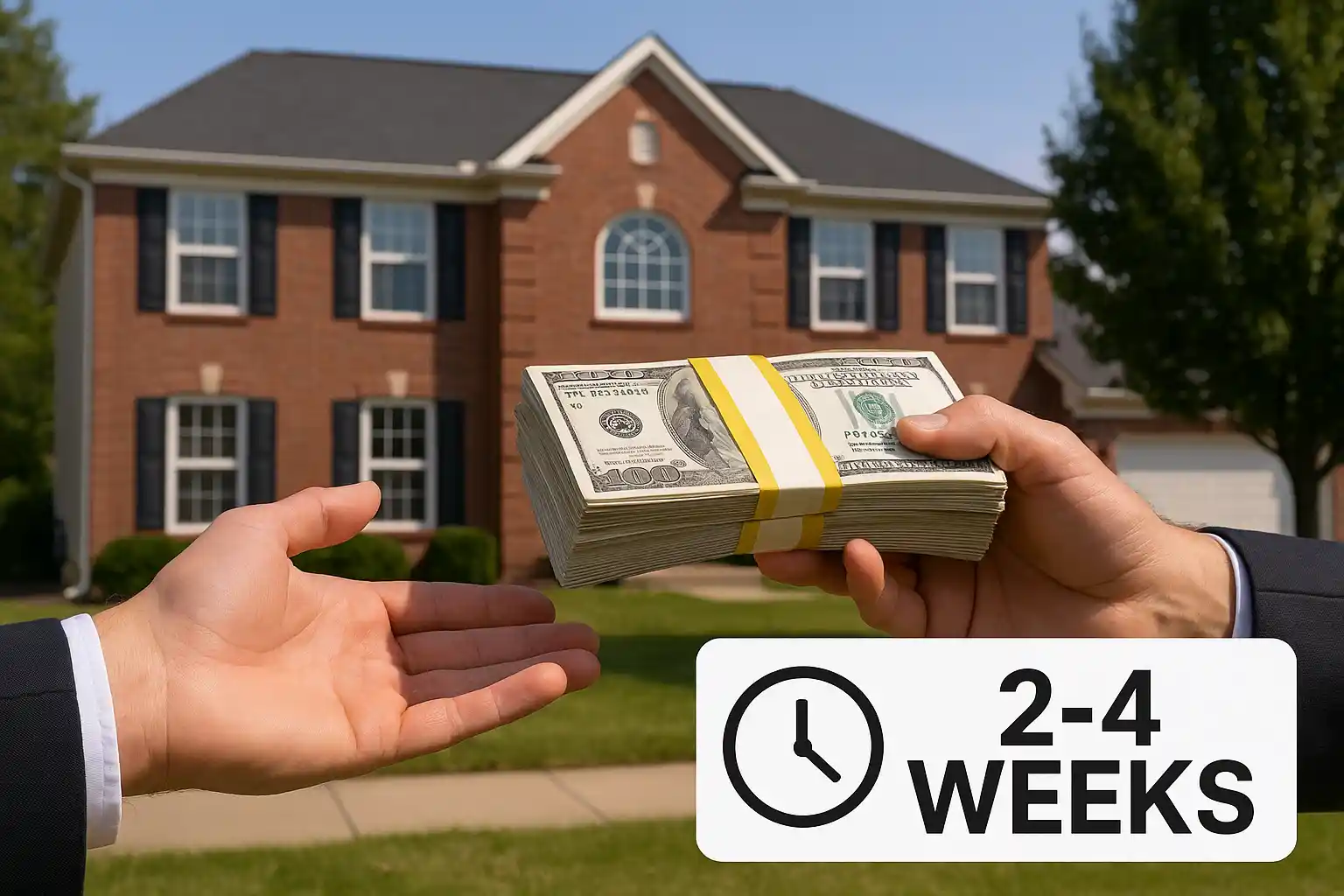
Why Cash Buyers are the Fastest Option for Virginia Land
When you need to sell Virginia land quickly, cash buyers eliminate the lengthy traditional process. We specialize in purchasing Virginia land directly, closing deals in 2-4 weeks instead of months.
How We Streamline the Process
No Traditional Hassles:
- Skip lengthy marketing and showing periods
- Eliminate financing contingencies and delays
- Handle all Virginia legal requirements and paperwork
- Pay all closing costs and fees
Our Virginia Advantage:
- Local knowledge of all Virginia counties
- Experience with Virginia land transfer requirements
- Direct cash purchases through secure escrow
- Flexible closing dates that work for you
Simple 3-Step Process
- Submit your Virginia property details online
- Receive a fair cash offer within 24-48 hours
- Choose your closing date and get paid
We've helped hundreds of Virginia landowners skip the complexity of traditional sales. Whether you inherited property, need quick cash, or want to avoid realtor fees, we provide a straightforward solution.
Ready to get started? Learn more about quick cash for land in Virginia and submit your property details today.

